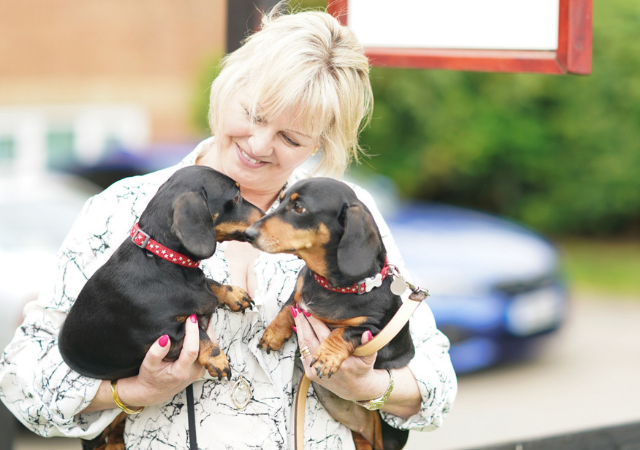
6 simple lifestyle changes for older dogs
November 7, 2022
As our pets get older their needs change. Dog owners will need to adapt their pet’s home environment, lifestyle, and routine to reflect these changes and give their pet the best quality of life in their senior and geriatric years.
Our veterinary team at Towcester Vets are highly experienced when it comes to treating senior pets and are here to help if you have noticed your dog struggling with mobility or simple tasks. Perhaps their behaviour has changed too?
Bring your dog in for a senior health check so our vets can see what’s going on and offer you practical advice.
Home & lifestyle changes for senior dogs
Adapting your senior dog’s home environment and routine is important to ensure their comfort and wellbeing. Owners can perhaps implementing these 6 changes and lifehacks to help make life easier for them.
- Avoid any impactful exercise such as jumping and ball catching
- Add non-slip rugs (or anti-slip tape underneath existing rugs) to laminate/tiled floors to prevent slips
- Raise food and water bowls off the floor
- Add ramps to steps or flooring height changes where your dog may struggle
- Get good quality, supportive bedding – try memory foam
- Do little exercise more often, rather than fewer long walks
Now, let’s look at these points in more detail.
Exercise
Simple environment and lifestyle changes really can have a huge impact on your senior dog’s comfort levels, as well as their mental health. Exercising regularly can help to keep their joints moving and give their minds regular mental stimulation. However, it’s important the exercise is little and often so that they are not doing too much that could cause harm to their joints. Our vet team also recommends avoiding walking small dogs off high pavement curbs and avoiding exercises that may cause impact to the joints such as playing frisbee and catch.
Swimming can be a great exercise for senior dogs as the warm water supports their joints and helps to strengthen muscles, whilst having a positive impact on their overall wellbeing.
Flooring
Modern day houses often have laminate and tiled flooring which can be a slip hazard to many dogs. As well as causing injuries, pets can develop anxiety about walking across flooring. Using non-slip rugs and runners is a great way of helping to give your dog stability and better grip so those incidents can be avoided. Lifehack – you can buy anti-slip tape to go under rugs too.
Food & water bowls
Many dogs eat and drink from a bowl off the floor. This can put a lot of pressure on their front legs when leaning down and make it uncomfortable. Raising the bowls up helps to relieve the pressure off their legs and makes eating and drinking more comfortable. This is very important in older dogs as they will often have higher hydration needs.
Impactful activities
As well as impactful exercises, it’s also important to consider the day-to-day activities that may be a concern. Activities such as going up and down stairs, jumping on and off the bed or settee, and in and out of the car, all put added pressure on a dog’s joints. Using ramps is a great way of still enabling your pet to do these activities but without the stress on their joints that can cause discomfort.
Comfortable bedding
As our pets age their activity levels decrease naturally and they spend more time resting and sleeping. Appropriate bedding can really make the difference between a comfortable or uncomfortable rest. Avoid using beds with high sides that can make it difficult to get in and out of as well as bedding that is very soft and unstable. Memory foam beds usually give good support whilst being comfortable and are a great option for arthritic dogs. For pets showing signs of incontinence, the use of toddler mattresses can be a great way of giving them comfort whilst keeping their bed hygienic.
Many of these simple changes really can make huge improvements to your dog’s comfort. However, different dogs have different needs based on their health, size, and activity levels.
Discussing your pet’s needs with one of the vets or nurses at your local Towcester Vets Clinic can help you identify more of these simple changes that can make a big difference.
Senior dogs & arthritis
Our team can also help you learn how to manage canine arthritis at home – a condition that affects most senior dogs. Speak to our team at Towcester Vets about the many resources that are available for arthritic dogs and the support we can offer to your pet and you – get in touch.
You may also find the Canine Arthritis Management website helpful as it has advice and products for arthritic dogs – visit it now.


